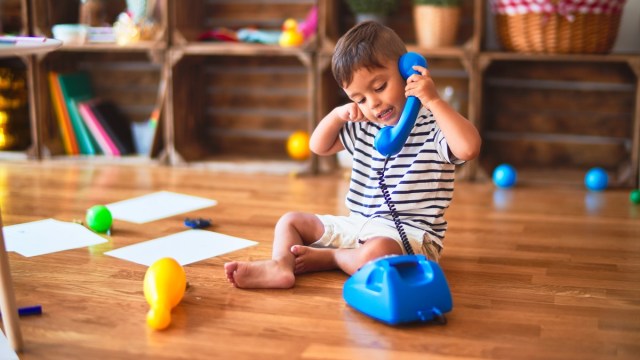Gone are the days where having a strong vocabulary only mattered on the SAT. Kids today—now, more than ever—need a solid vocabulary, not only for success in school, but also to express themselves in a way that empowers them to make an impact on the world around them. According to Boston Children’s Hospital, the most important thing you can do to help a child experiencing heightened stress and anxiety is to listen to them. And if they have the vocabulary (and emotional awareness) to express themselves, you’ve equipped them to take control of that situation. So whether you’re motivated to build toddler language development for school success or for social and emotional reasons, you’re winning at parenting. And these language development games and activities for kids can help you do it.
1. Read Together
We’ll bet you’re already practicing this toddler language development strategy in your home without even realizing it. According to Sandra Gatlin, a fourth-grade teacher with over 30 years of experience, “The key to a broad vocabulary is to foster a love of reading in your child. Whether from reading together as toddlers, or listening to them read to you as they develop their abilities, you cannot find a better way to expand your vocabulary.”
Extra Credit: Don’t stop reading to your kids, even after they can do it on their own. Choose a book that interests them that’s above their reading level, and “talk about what you’re reading, so you can work on comprehension, too,” adds Gatlin.
Related: 40 of the Very Best Books for Toddlers
2. Go Hunting for Sight Words with Nerf Guns
“My son doesn’t want to look at a workbook or sit still after he’s been at school all day,” mom and educator extraordinaire, Anne Hart, says. So she wrote sight words on Post-It notes and stuck them on the ceiling, near the baseboards, and behind doors throughout her house. Now, her son picks up a Nerf gun and gets prizes for shooting the right word that Hart calls out. We love this strategy that supports toddler language development and makes it fun in the process.
Extra Credit: Don’t stop at sight words. You can play this game with vocabulary words and definitions. Just write the word on the Post-It note, and read the definition out to your hunter, who’ll go “hunting” for the correct word.
3. Match and Go Seek
Another great toddler language development game, match and go seek, also involves Post-It notes. Make two copies of each word, then give one stack to your child, and place the other notes on corresponding items. For instance, give your child a Post-It note with the word “tree” written on it, then place another one on the trunk of a tree in the backyard. Get more creative and advanced as his or her vocabulary grows.
Extra Credit: The National Center on Improving Literacy reports that “remote literacy learning includes a mixture of literacy learning experiences that are teacher-led, family-led, and student-led. Parents have an important role in helping develop your child’s literacy skills.” Your involvement in growing your child’s vocabulary has never been more important.

4. Talk to Your Children
Tracy Cutchlow, author of Zero to Five: 70 Essential Parenting Tips Based on Science, says three-year-olds with whom parents regularly engage in contextualized conversation have IQs 150% greater than those whose parents don’t talk to them. And, since your child’s vocabulary can quadruple in their second year of life, you can’t start too early when it comes to talking to them.
Extra Credit: “It’s hard to know what to say to someone who doesn’t talk back,” says Atlanta preschool director Nancy Hill. “But I used to talk to my daughter so much when she was an infant that I’d be startled when my husband would come home and actually talk back to me!” She suggests listening to the sounds around you—like a bird tweeting, a truck rumbling, or a dog barking—then repeating the sound and labeling it as “bird,” “truck,” or “dog.”
5. Introduce Sneaky Synonyms
When your child tells you something, respond in a way that introduces a synonym for the word they used. For example, if your child says that the dog was “really big,” you might reply and say it sounds “gigantic.” Reading Rockets, a website dedicated to helping kids learn to read, suggests that parents keep new words active since kids learn by repetition and practice. Don’t just say it once. Instead, find ways to work it into your conversation multiple times.
Extra Credit: Kids love telling stories. Give them a topic and have them tell you a story about it. This gives you ample opportunities to introduce sneaky synonyms in an organic way.

6. Use Word Play in Favorite Songs
Rhymes have always been used as a tool in learning, so it’s no surprise that kids love changing the lyrics for favorite songs. “When ‘Old Town Road’ was being played all the time on the radio, I changed the lyrics to I’m gonna take my mom to the grocery store, she’s gonna shop like she can’t no more…My kids caught on, and every time the song came on we’d make up a new grocery list, instead of singing the song’s actual lyrics,” said mother of four Renee Stafford.
Extra Credit: Along the same lines, you can kill plenty of time on long car rides by making a collaborative poem. One person starts the poem, then the next person adds a line, and on.
Related: Spotify Playlists for Babies & Toddlers That Parents Will Actually Enjoy
7. Write Stories
“Verbal and written vocabularies often don’t match up, with verbal vocabulary being stronger for many years because of the help of context clues within sentence structure,” says Prof. of Early Childhood Education and Literacy Meredith Cristofferson. One way to help bridge the gap? Have your kids write their own stories. It’s like working your back muscles to improve your abdomen’s strength. Creating context for words helps you develop your use of words, and helps you look for new ways to represent ideas.
Extra Credit: Give your kids a word bank and ask them to write a story using the words you’ve given them. Be sure and provide them with a list of verbs, nouns, adjectives, and adverbs.
Related: Life Sentence: 6 Ways to Write a Story with Kids











